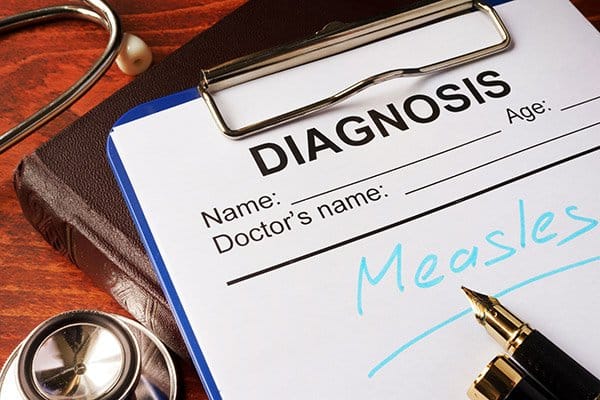If you’ve heard about measles in the news recently, you’ve heard correctly. In a press release dated March 8, 2019 The Texas Department of State Health confirmed 11 measles cases in Texas so far this year. Seven counties documented one case each and Harris County (Houston metro area) has recorded four. For reference, a total of nine cases were confirmed in Texas in all of 2018 and only one in 2017.
Measles is a highly infectious disease (sometimes called rubeola) caused by a virus. It typically begins with fever, runny nose, cough, red eyes, and sore throat, followed by a blotchy red rash which often starts on the head and moves over the entire body. Measles is a highly contagious respiratory illness spread by contact with an infected person through coughing and sneezing. Measles is so contagious that if someone has it, 90 percent of the people around that person who are not immune will become infected. Symptoms generally appear within 7-14 days after exposure and can last for several weeks.
How is measles treated?
Because measles is a viral disease, there is no specific medical treatment. Symptoms should be managed by use of a non-aspirin fever and pain reliever such as acetaminophen or ibuprofen, giving plenty of fluids, and encouraging extra rest.
Children with measles should be kept away from others for 4 days after the rash first appears.
Call your doctor right away if you think your child may have measles or has been around someone known to have the illness.
What are the potential complications from measles?
Children with measles should be closely monitored by a healthcare provider. Possible complications include ear infections, croup, diarrhea, pneumonia, and encephalitis. Measles can also cause pregnant women to give birth prematurely or to have a low birth-weight baby.
How can measles by prevented?
DSHS (Department of State Health Services) and the Centers for Disease Control and Prevention recommend children get a dose of measles vaccine at 12-15 months of age and again at 4-6 years. Protection against measles is most often included as part of the MMR (measles-mumps-rubella) vaccine. The measles vaccine is very effective, about 97 percent after two doses.
What are the dangers of vaccination?
Outbreaks of measles, as well as mumps and rubella, in the US are not as common as they were before use of the vaccine. The MMR vaccine prevents against dangerous, potentially deadly, diseases. The most common adverse effects after administration of the vaccine include pain at the site of injection, mild fever, mild rash, and swollen glands.
Although the MMR immunizations are not administered at Integrity Urgent Care locations, we can answer questions you might have about the vaccination or measle-like symptoms. Call or contact us, and we’ll be sure to refer you to a healthcare provider if necessary.
Resources:
Ben-Joseph EP [reviewer]. Measles. KidsHealth from Nemours [online]. Mar 2019 [accessed 11 Mar 2019]. https://kidshealth.org/en/parents/measles.html
Centers for Disease Control and Prevention, National Center for Emerging and Zoonotic Infectious Diseases (NCEZID), Division of Healthcare Quality Promotion (DHQP). Measles, mumps, and rubella (MMR) vaccine safety studies. CDC Vaccine Safety [online]. Last reviewed 28 Aug 2015 [accessed 11 Mar 2019]. https://www.cdc.gov/vaccinesafety/vaccines/mmr/mmr-studies.html?CDC_AA_refVal=https%3A%2F%2Fwww.cdc.gov%2Fvaccinesafety%2Fvaccines%2Fmmr%2FMMR.html
National Center for Immunization and Respiratory Diseases. Measles, mumps, and rubella (MMR) vaccination: What everyone should know. CDC Vaccines and Preventable Diseases [online]. Last updated 2 Feb 2018 [accessed 11 Mar 2019]. https://www.cdc.gov/vaccines/vpd/mmr/public/index.html
National Center for Immunization and Respiratory Diseases, Division of Viral Diseases. Measles (Rubeola). CDC A-Z Index [online]. Last reviewed 11 Mar 2019 [accessed 11 Mar 2019]. https://www.cdc.gov/measles/index.html
US National Library of Medicine. Measles. MedlinePlus [online]. Last updated 21 Dec 2018 [accessed 11 Mar 2019]. https://medlineplus.gov/measles.html




